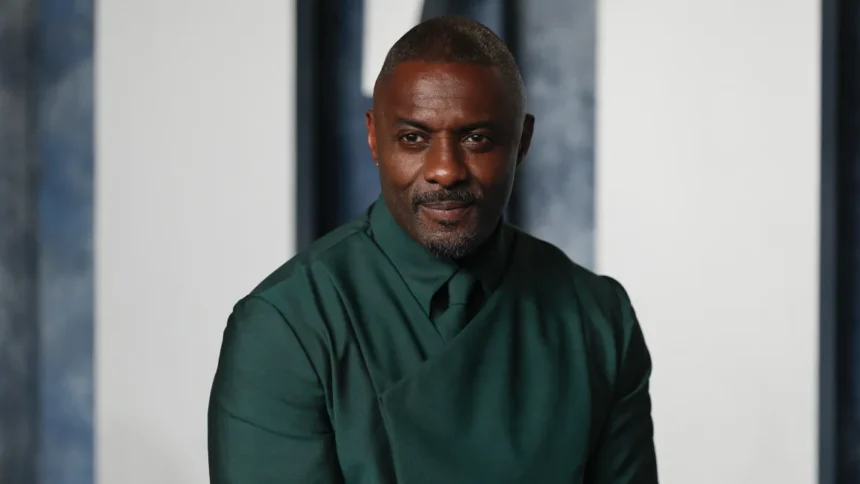Idris Elba, the acclaimed actor known for his powerful performances in The Wire and Luther, has set his sights on a new mission—transforming the entertainment landscape in Africa. Elba, whose parents are from Sierra Leone and Ghana, is no stranger to global success. But now, he’s turning his attention to a project that aims to uplift and empower African creatives, starting with the construction of world-class film studios across the continent.
The first step in this ambitious vision is Zanzibar, a Tanzanian semi-autonomous island famous for its stunning beaches and rich cultural heritage. Elba’s idea was born after a pivotal meeting with Tanzanian President Samia Suluhu Hassan at the World Economic Forum in Davos last year. Their discussions sparked a shared dream of turning Zanzibar into a thriving hub for African cinema, and in August, the Zanzibari government allocated nearly 200 acres for the project.
A New “Zallywood” in the Making
According to Zanzibar’s Minister for Investment, Shariff Ali Shariff, Elba’s plan is to create a film studio comparable to Hollywood, Nigeria’s Nollywood, and India’s Bollywood. The minister even joked about coining the term “Zallywood” or “Zawood” for the emerging industry. But for Elba, this is more than a business venture—it’s about changing the global narrative about Africa.
In an interview with CNN at the Stellar Development Foundation’s Meridian conference in London, Elba highlighted the gap in Africa’s representation in the global creative economy. “Much of the imagery about Africa isn’t even generated from Africa,” he said. “A lot of media is centered around negative depictions of Africa. But the median age in Africa is 19; these young people are optimistic and deserve the chance to tell their own stories.”
Africa’s Untapped Creative Potential
Africa is home to 18% of the world’s population, yet it contributes only 1% to the global creative economy—a discrepancy Elba is determined to change. With projections from Goldman Sachs showing that the creative sector could double within five years, the timing couldn’t be more ideal. A recent UNESCO report also suggests that Africa’s film and audiovisual industry has the potential to create 20 million jobs and add $20 billion to the continent’s GDP by 2030.
Global giants like Netflix and Disney have already recognized this potential, investing heavily in Kenya, South Africa, and Nigeria. But Elba points out that many African governments still overlook the creative sector’s economic power. Issues like copyright laws, lack of financing, and limited regulation have stifled growth.
Elba sees Africa’s potential in much the same way South Korea transformed its entertainment industry. Between 2017 and 2021, South Korean pop-culture exports grew by 13.7% annually, contributing $27 billion to the national economy. Tanzania is already following a similar path, partnering with South Korea to send African actors for training in Busan, one of South Korea’s film hubs.
Building More Than Studios: Empowering Creators with Financial Inclusion
However, Elba knows that simply building studios won’t be enough to revolutionize African cinema. The project also needs to address structural challenges, especially in countries with limited banking infrastructure. Creators in these regions often struggle with basic issues like how to get paid for their work.
“It’s all been a puzzle,” Elba admitted, acknowledging the complexities of building a new industry. One critical piece of that puzzle is finding a way to ensure creators are compensated fairly and efficiently.
To solve this, Elba has partnered with Stellar, a blockchain-based platform, to launch Akuna Wallet—a digital payment system specifically designed for the creative economy. Akuna Wallet allows artists, filmmakers, and musicians to manage payments and royalties without relying on traditional banks. It enables peer-to-peer transactions in digital currencies, providing a secure solution for regions with weak financial infrastructure.
In many African countries, including Ghana, nearly 60% of the population under 25 is unbanked, meaning they have no access to traditional banking services. This limits their ability to participate fully in the global creative economy.
This week, a pilot program for Akuna Wallet was launched in partnership with the Ghanaian government. The goal is to streamline payments for local creatives, making it easier for them to earn a living from their talents. “Popular platforms for monetizing creative work often require bank accounts, which excludes many young Africans,” Elba said. “We need a financial model that allows for consistent quality creation.”
A Human-Centered Approach to Growth
Elba’s approach reflects more than just economic ambition—it’s about giving young Africans the tools and opportunities they need to succeed. “The stories from Africa need to be told by Africans,” he said, emphasizing that representation matters not just for cultural pride, but also for economic sustainability.
Elba is optimistic that if local governments begin to see the value of a thriving entertainment economy, they will do more to nurture it. “It will grow, and it can grow,” he said, with a determined vision for Africa’s future on the global stage.
A Revolution in the Making
While the road ahead may be challenging, Elba’s belief in the transformative power of storytelling is unshaken. By combining cutting-edge technology, creative talent, and financial innovation, he aims to put Africa at the center of the global entertainment map. With a focus on building an industry that reflects the hopes, dreams, and realities of Africa’s young population, Idris Elba’s bold vision holds the promise of sparking an entertainment revolution—one that’s human-centered and rooted in the continent’s rich cultural heritage.
The stage is set, and Africa’s creative future is brighter than ever.




